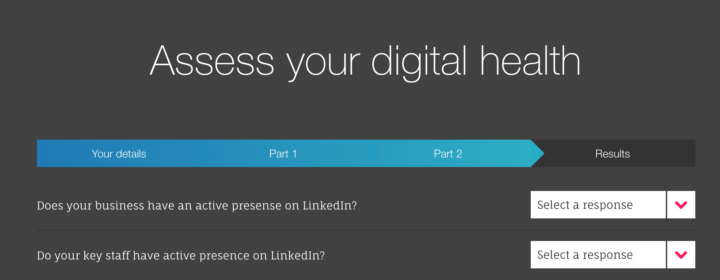
100s of thousands of Small Businesses right now are grappling with how to use Digital Marketing to grow their business.
Every day I work with clients that own or manage Small Businesses. And every time I meet a new one, I see the same common mistakes when it comes to dealing with all things Digital for that business.
Firstly, let’s get one thing clear. Digital is not something you can “do”, it is something you naturally “become”. It’s not a task on a to-do list, or a project. It’s not even really a campaign. It’s a way of running a business, a new way to think, feel and act. So don’t get caught in the trap of trying to “tick” digital off of your list, and instead start by conducting a “Digital Audit”. Truly understand where you are on your Digital Journey, and how the digital landscape looks in your particular niche.
Step 1 – Ask the basic questions.
Start by auditing your own digital activity for your business. Ask yourself all of these questions:
- How many enquiries, on average, do you receive through your website, per week?
- How many unique visitors, on average, does your website receive, per month?
- Does your website have a mobile or tablet version?
- Does your website have a Blog?
- Do you collect user’s details for marketing purposes through your website?
- Does your website have Social Media functionality? (e.g. Share, Like, Pin, Tweet, etc)
- Does your website get found for important terms on Google?
- Do you have a strategy for capturing leads through your website?
- Do you have a system in place for tracking leads and enquiries from your website?
- Do you have the ability to control your website via a CMS (Content Management System)?
- Does your website clearly and concisely explain what your business does / provides?
- Do you have a maintenance & security plan to protect your website from hacking?
- Does your business have an active presence on LinkedIn?
- Do your key staff have active presence on LinkedIn?
- Does your business have an active presence on Twitter?
- Does your business have an active presence on Facebook?
- Do you use any other Social Media platforms to promote your business?
- Is someone continually working on your website’s Search Engine Optimisation?
- Do you regularly analyse your website and Social Media traffic?
- Do you have an Email Marketing strategy in place?
- How often do you post blogs or articles on your website and Social Media platforms?
- When did you last review your website and online marketing strategy?
- Approximately what % of your revenue is re-invested in online marketing?
(Top tip – if you want to use a quick system to do this, use the free tool on my agency’s site, here).

The exercise of going through those questions will give you a pretty good idea of where you stand in terms of “digital readiness”, and will likely raise additional questions or thoughts in the process.
Step 2 – Map out the elements of your business that will be affected by going Digital
Digital doesn’t just affect Marketing. It can, and should, impact every aspect of the business. From Operational (digitising admin tasks, and delivery tasks), to Finance (moving to online payments, electronic invoicing etc), Sales (moving to digital tools for Sales and CRM etc). So, once you’ve understood where you may lack from the questions above, take that a step further and think about how digital / web tech could be making your life easier across Ops, Finance and Sales too.
Here are some examples of business processes you should be auditing:
- Your customer on-boarding process. When you win a new customer, there are certain admin and communications tasks to be done. Set them up on your accounts system, check their credit references, add them (or update their status) to your CRM system, advise them on information they need, or actions they need to take etc to get the ball rolling. ALL or most of these things can be automated using web technology, and you may be surprised at just how cost-effective it is to create such a system.
- Your internal project setup/management process. Every time you start a new project or service for a client, there are tasks and processes that you are repeating each time. Of course, some bits of those will be tailored, but a large majority can be automated, and perhaps even automatically triggered by the on-boarding process we looked at above.
- How you collect money. From how you deliver invoices, to automated credit control, to collecting credit card or direct debit payments online, digital offers the opportunity to streamline these functions and find untapped bottom line profits in the process

Step 3 – Start to build a plan based on Steps 1 and 2
Now that you’ve studied Marketing, Ops, Finance and Sales from a digital perspective and seen:
- What you’ve got
- What’s missing
- Where the opportunities lie
You can now start to capture the exact actions and projects required to pull all of that together and make it a reality.
Your Digital Plan should be split into the 4 categories of Marketing, Ops, Finance and Sales, and clearly show exactly what needs to be built / grown / optimised / solved, who is the right person to do it, an approximate budget for achieving it, and a reasonable timeline for doing so.
Please allow yourself at least a couple of dedicated days to get a solid draft of this plan going. Feel free to fire me questions as you go along, and let me know how you get on! Or, if you value your time then you could always outsource the task!





